-
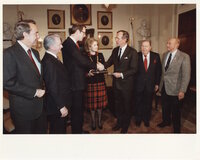 Photograph of Senator Jay Rockefeller being sworn into Congress
Photograph of Senator Jay Rockefeller being sworn into Congress Jay Rockefeller swearing-in to the Senate by Vice President George H.W. Bush Senator John D. (Jay) Rockefeller IV papers
-
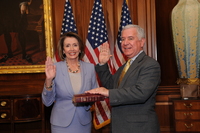 Photograph of Congressman Nick Rahall being sworn into Congress
Photograph of Congressman Nick Rahall being sworn into Congress Photograph of Congressman Nick Rahall swearing-in by Speaker of the House Nancy Pelosi
-
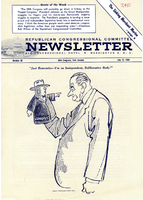 Republican Congressional Committee Newsletter
Republican Congressional Committee Newsletter The RCC newsletter featured an image of President Lyndon Johnson holding a puppet Congress.
-
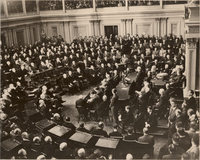 Photograph of British Prime Minister Winston Churchill addressing Congress
Photograph of British Prime Minister Winston Churchill addressing Congress British Prime Minister Winston Churchill addressing a joint session of Congress in the Senate Chamber
-
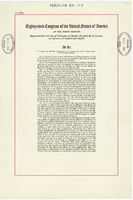 Voting Rights Act of 1965
Voting Rights Act of 1965 On August 6, 1965, President Lyndon Johnson signed the Act into law at the Capitol.
-
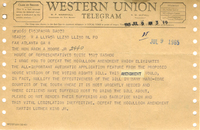 Telegram from Martin Luther King Jr.
Telegram from Martin Luther King Jr. House Republicans proposed a substitute bill, H.R. 7896. Known as the Ford-McCulloch bill, it removed the automatic triggers. Civil rights leader Martin Luther King Jr., sent a telegram to Congressman Arch Moore expressing strong opposition to the Ford-McCulloch bill. On July 9, 1965, the House rejected the substitute bill by a vote of 166 to 215.
-
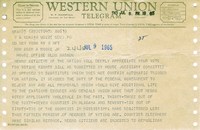 Telegram from Executive Director, NAACP
Telegram from Executive Director, NAACP House Republicans proposed a substitute bill, H.R. 7896. Known as the Ford-McCulloch bill, it removed the automatic triggers. Roy Wilkins, executive director of the NAACP, sent a Telex message to Congressman Arch Moore expressing strong opposition to the Ford-McCulloch bill. On July 9, 1965, the House rejected the substitute bill by a vote of 166 to 215.
-
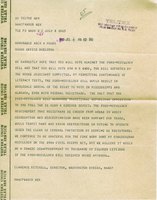 Telex message from Washington Bureau, NAACP
Telex message from Washington Bureau, NAACP House Republicans proposed a substitute bill, H.R. 7896. Known as the Ford-McCulloch bill, it removed the automatic triggers. Clarence Mitchell, director of the Washington Bureau of the NAACP, sent a Telex message to Congressman Arch Moore expressing strong opposition to the Ford-McCulloch bill. On July 9, 1965, the House rejected the substitute bill by a vote of 166 to 215.
-
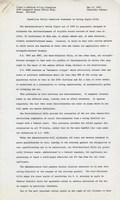 Republican Policy Committee Statement on Voting Rights Bills
Republican Policy Committee Statement on Voting Rights Bills House Republicans proposed a substitute bill, H.R. 7896. Known as the Ford-McCulloch bill, it removed the automatic triggers. On July 9, 1965, the House rejected the substitute bill by a vote of 166 to 215.
-
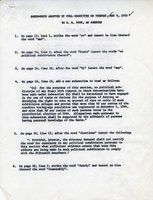 Amendments adopted by full House Judiciary Committee
Amendments adopted by full House Judiciary Committee The document, "Amendments Adopted by Full Committee on Tuesday, May 4, 1965 to H.R. 6400 As Amended," shows some of the changes adopted by the House Judiciary Committee as it worked through the voting rights bill. The House Judiciary Committee reported a revised H.R. 6400 on June 1, 1965.
-
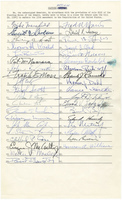 Senate petition for cloture motion
Senate petition for cloture motion In the Senate, a 24-day filibuster of the bill ensued. Southern senators expressed the belief that the bill was unconstitutional and punitive to the South. On May 21, 1965, 29 Democrats and 9 Republicans signed a petition for a cloture motion. Four days later, the Senate approved debate-limiting cloture by a vote of 70 to 30. This was only the second time in its history, and the second time in two years, that the Senate had stopped debate in order to vote on a civil rights bill. On May 26, the Senate passed S. 1564 by a vote of 77 to 19.
-
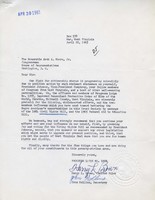 Letter from the Improved Benevolent Protective Order of Elks of the World, War, W.Va.
Letter from the Improved Benevolent Protective Order of Elks of the World, War, W.Va. As Congress debated the voting rights bill, the Improved Benevolent Protective Order of Elks of the World located in War, W.Va., wrote to Congressman Arch Moore to express support for the legislation.
-
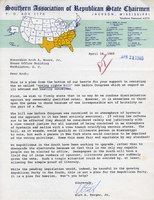 Letter from the Southern Association of Republican State Chairmen of Jackson, Miss.
Letter from the Southern Association of Republican State Chairmen of Jackson, Miss. As Congress debated the voting rights bill, the Southern Association of Republican State Chairmen wrote to Congressman Arch Moore to express opposition to the legislation.
-
 Letter from the Warwood Methodist Church, Wheeling, W.Va.
Letter from the Warwood Methodist Church, Wheeling, W.Va. As Congress debated the voting rights bill, the Warwood Methodist Church of Wheeling, W.Va., wrote to Congressman Arch Moore to urge his support for the measure.
-
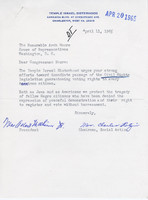 Letter from the Temple Israel Sisterhood of Charleston, W.Va.
Letter from the Temple Israel Sisterhood of Charleston, W.Va. As Congress debated the voting rights bill, the Temple Israel Sisterhood of Charleston, W.Va., wrote to Congressman Arch Moore to express their support for the legislation.
-
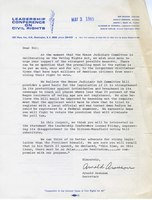 Correspondence from the Leadership Conference on Civil Rights
Correspondence from the Leadership Conference on Civil Rights
The Senate debated whether the Federal Government had the authority to ban poll taxes in state and local elections. As introduced, the administration bill did not ban such poll taxes. On April 9, the Senate Judiciary Committee reported a bill with a complete ban on poll taxes. Senate leaders Mike Mansfield (D-MT) and Everett Dirksen (R-IL) deleted the provision and substituted one authorizing federal courts to determine if local poll taxes were racially discriminatory. In a letter Arnold Aronson, Secretary, Leadership Conference on Civil Rights, urged Congressman Arch Moore to support a voting rights bill that eliminated all poll taxes. Senator Edward M. Kennedy (D-MA) sponsored a floor amendment that restored the committee-reported bill’s ban on all poll taxes. On May 11, the Senate narrowly defeated Kennedy’s amendment.
-
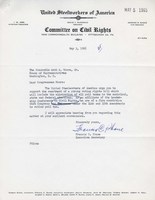 Correspondence from United Steelworkers of America
Correspondence from United Steelworkers of America The Senate debated whether the Federal Government had the authority to ban poll taxes in state and local elections. As introduced, the administration bill did not ban such poll taxes. On April 9, the Senate Judiciary Committee reported a bill with a complete ban on poll taxes. Senate leaders Mike Mansfield (D-MT) and Everett Dirksen (R-IL) deleted the provision and substituted one authorizing federal courts to determine if local poll taxes were racially discriminatory. In a letter Francis C. Shane, Executive Secretary, United Steelworkers of America Committee on Civil Rights, urged Congressman Arch Moore to support a voting rights bill that eliminated all poll taxes. Senator Edward M. Kennedy (D-MA) sponsored a floor amendment that restored the committee-reported bill’s ban on all poll taxes. On May 11, the Senate narrowly defeated Kennedy’s amendment.
-
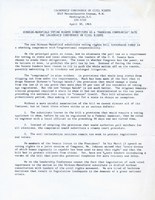 Leadership Conference on Civil Rights press release
Leadership Conference on Civil Rights press release The Senate debated whether the Federal Government had the authority to ban poll taxes in state and local elections. As introduced, the administration bill did not ban such poll taxes. On April 9, the Senate Judiciary Committee reported a bill with a complete ban on poll taxes. Senate leaders Mike Mansfield (D-MT) and Everett Dirksen (R-IL) deleted the provision and substituted one authorizing federal courts to determine if local poll taxes were racially discriminatory. The Leadership Conference on Civil Rights expressed displeasure with the Dirksen-Mansfield compromise. Senator Edward M. Kennedy (D-MA) sponsored a floor amendment that restored the committee-reported bill’s ban on all poll taxes. On May 11, the Senate narrowly defeated Kennedy’s amendment.
-
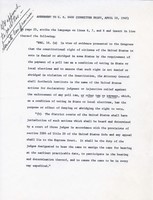 Amendment to H.R. 6400
Amendment to H.R. 6400 On March 18, 1965, Representative Emanuel Celler (D-NY), chair of the House Committee on the Judiciary, introduced the administration bill, H.R. 6400. The Committee reported a revised H.R. 6400 on June 1, 1965.
-
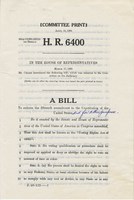 H.R. 6400 [Committee Print]
H.R. 6400 [Committee Print] On March 18, 1965, Representative Emanuel Celler (D-NY), chair of the House Committee on the Judiciary, introduced the administration bill, H.R. 6400. The Committee reported a revised H.R. 6400 on June 1, 1965.
-
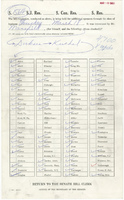 Sponsor Sheet for S. 1564
Sponsor Sheet for S. 1564 Sixty-six senators signed on as co-sponsors of the voting rights bill, and the bill was referred to the Senate Committee on the Judiciary. The Committee was given explicit instructions to report back no later than April 9. Instructions were necessary because the chair, Senator James O. Eastland (D-MS), had never willingly reported a civil rights bill to the Senate floor for a vote.
-
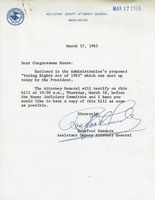 Correspondence from the Assistant Deputy Attorney General
Correspondence from the Assistant Deputy Attorney General On March 17, 1965, the Johnson Administration sent its voting rights bill to members of the Senate and the House.
-
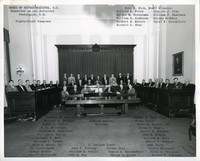 Photograph of the House Committee on the Judiciary
Photograph of the House Committee on the Judiciary On March 17, 1965, the Johnson Administration’s voting rights bill was sent to members of the Senate and the House. The House Committee on the Judiciary began hearings on the bill, H.R. 6400, the following day.
-
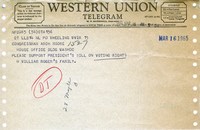 Telegram from Wheeling, W.Va., constituent in support of a voting rights bill
Telegram from Wheeling, W.Va., constituent in support of a voting rights bill The constituent asked Congressman Arch Moore to support the civil rights bill outlined by President Johnson in his address to Congress.
-
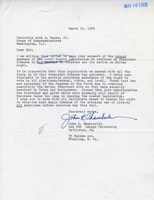 Letter from Wheeling, W.Va., constituent in support of a voting rights bill
Letter from Wheeling, W.Va., constituent in support of a voting rights bill The constituent asked Congressman Arch Moore to support the civil rights bill outlined by President Johnson in his address to Congress.
 Photograph of Senator Jay Rockefeller being sworn into Congress Jay Rockefeller swearing-in to the Senate by Vice President George H.W. Bush Senator John D. (Jay) Rockefeller IV papers
Photograph of Senator Jay Rockefeller being sworn into Congress Jay Rockefeller swearing-in to the Senate by Vice President George H.W. Bush Senator John D. (Jay) Rockefeller IV papers Photograph of Congressman Nick Rahall being sworn into Congress Photograph of Congressman Nick Rahall swearing-in by Speaker of the House Nancy Pelosi
Photograph of Congressman Nick Rahall being sworn into Congress Photograph of Congressman Nick Rahall swearing-in by Speaker of the House Nancy Pelosi Republican Congressional Committee Newsletter The RCC newsletter featured an image of President Lyndon Johnson holding a puppet Congress.
Republican Congressional Committee Newsletter The RCC newsletter featured an image of President Lyndon Johnson holding a puppet Congress. Photograph of British Prime Minister Winston Churchill addressing Congress British Prime Minister Winston Churchill addressing a joint session of Congress in the Senate Chamber
Photograph of British Prime Minister Winston Churchill addressing Congress British Prime Minister Winston Churchill addressing a joint session of Congress in the Senate Chamber Voting Rights Act of 1965 On August 6, 1965, President Lyndon Johnson signed the Act into law at the Capitol.
Voting Rights Act of 1965 On August 6, 1965, President Lyndon Johnson signed the Act into law at the Capitol. Telegram from Martin Luther King Jr. House Republicans proposed a substitute bill, H.R. 7896. Known as the Ford-McCulloch bill, it removed the automatic triggers. Civil rights leader Martin Luther King Jr., sent a telegram to Congressman Arch Moore expressing strong opposition to the Ford-McCulloch bill. On July 9, 1965, the House rejected the substitute bill by a vote of 166 to 215.
Telegram from Martin Luther King Jr. House Republicans proposed a substitute bill, H.R. 7896. Known as the Ford-McCulloch bill, it removed the automatic triggers. Civil rights leader Martin Luther King Jr., sent a telegram to Congressman Arch Moore expressing strong opposition to the Ford-McCulloch bill. On July 9, 1965, the House rejected the substitute bill by a vote of 166 to 215. Telegram from Executive Director, NAACP House Republicans proposed a substitute bill, H.R. 7896. Known as the Ford-McCulloch bill, it removed the automatic triggers. Roy Wilkins, executive director of the NAACP, sent a Telex message to Congressman Arch Moore expressing strong opposition to the Ford-McCulloch bill. On July 9, 1965, the House rejected the substitute bill by a vote of 166 to 215.
Telegram from Executive Director, NAACP House Republicans proposed a substitute bill, H.R. 7896. Known as the Ford-McCulloch bill, it removed the automatic triggers. Roy Wilkins, executive director of the NAACP, sent a Telex message to Congressman Arch Moore expressing strong opposition to the Ford-McCulloch bill. On July 9, 1965, the House rejected the substitute bill by a vote of 166 to 215. Telex message from Washington Bureau, NAACP House Republicans proposed a substitute bill, H.R. 7896. Known as the Ford-McCulloch bill, it removed the automatic triggers. Clarence Mitchell, director of the Washington Bureau of the NAACP, sent a Telex message to Congressman Arch Moore expressing strong opposition to the Ford-McCulloch bill. On July 9, 1965, the House rejected the substitute bill by a vote of 166 to 215.
Telex message from Washington Bureau, NAACP House Republicans proposed a substitute bill, H.R. 7896. Known as the Ford-McCulloch bill, it removed the automatic triggers. Clarence Mitchell, director of the Washington Bureau of the NAACP, sent a Telex message to Congressman Arch Moore expressing strong opposition to the Ford-McCulloch bill. On July 9, 1965, the House rejected the substitute bill by a vote of 166 to 215. Republican Policy Committee Statement on Voting Rights Bills House Republicans proposed a substitute bill, H.R. 7896. Known as the Ford-McCulloch bill, it removed the automatic triggers. On July 9, 1965, the House rejected the substitute bill by a vote of 166 to 215.
Republican Policy Committee Statement on Voting Rights Bills House Republicans proposed a substitute bill, H.R. 7896. Known as the Ford-McCulloch bill, it removed the automatic triggers. On July 9, 1965, the House rejected the substitute bill by a vote of 166 to 215. Amendments adopted by full House Judiciary Committee The document, "Amendments Adopted by Full Committee on Tuesday, May 4, 1965 to H.R. 6400 As Amended," shows some of the changes adopted by the House Judiciary Committee as it worked through the voting rights bill. The House Judiciary Committee reported a revised H.R. 6400 on June 1, 1965.
Amendments adopted by full House Judiciary Committee The document, "Amendments Adopted by Full Committee on Tuesday, May 4, 1965 to H.R. 6400 As Amended," shows some of the changes adopted by the House Judiciary Committee as it worked through the voting rights bill. The House Judiciary Committee reported a revised H.R. 6400 on June 1, 1965. Senate petition for cloture motion In the Senate, a 24-day filibuster of the bill ensued. Southern senators expressed the belief that the bill was unconstitutional and punitive to the South. On May 21, 1965, 29 Democrats and 9 Republicans signed a petition for a cloture motion. Four days later, the Senate approved debate-limiting cloture by a vote of 70 to 30. This was only the second time in its history, and the second time in two years, that the Senate had stopped debate in order to vote on a civil rights bill. On May 26, the Senate passed S. 1564 by a vote of 77 to 19.
Senate petition for cloture motion In the Senate, a 24-day filibuster of the bill ensued. Southern senators expressed the belief that the bill was unconstitutional and punitive to the South. On May 21, 1965, 29 Democrats and 9 Republicans signed a petition for a cloture motion. Four days later, the Senate approved debate-limiting cloture by a vote of 70 to 30. This was only the second time in its history, and the second time in two years, that the Senate had stopped debate in order to vote on a civil rights bill. On May 26, the Senate passed S. 1564 by a vote of 77 to 19. Letter from the Improved Benevolent Protective Order of Elks of the World, War, W.Va. As Congress debated the voting rights bill, the Improved Benevolent Protective Order of Elks of the World located in War, W.Va., wrote to Congressman Arch Moore to express support for the legislation.
Letter from the Improved Benevolent Protective Order of Elks of the World, War, W.Va. As Congress debated the voting rights bill, the Improved Benevolent Protective Order of Elks of the World located in War, W.Va., wrote to Congressman Arch Moore to express support for the legislation. Letter from the Southern Association of Republican State Chairmen of Jackson, Miss. As Congress debated the voting rights bill, the Southern Association of Republican State Chairmen wrote to Congressman Arch Moore to express opposition to the legislation.
Letter from the Southern Association of Republican State Chairmen of Jackson, Miss. As Congress debated the voting rights bill, the Southern Association of Republican State Chairmen wrote to Congressman Arch Moore to express opposition to the legislation. Letter from the Warwood Methodist Church, Wheeling, W.Va. As Congress debated the voting rights bill, the Warwood Methodist Church of Wheeling, W.Va., wrote to Congressman Arch Moore to urge his support for the measure.
Letter from the Warwood Methodist Church, Wheeling, W.Va. As Congress debated the voting rights bill, the Warwood Methodist Church of Wheeling, W.Va., wrote to Congressman Arch Moore to urge his support for the measure. Letter from the Temple Israel Sisterhood of Charleston, W.Va. As Congress debated the voting rights bill, the Temple Israel Sisterhood of Charleston, W.Va., wrote to Congressman Arch Moore to express their support for the legislation.
Letter from the Temple Israel Sisterhood of Charleston, W.Va. As Congress debated the voting rights bill, the Temple Israel Sisterhood of Charleston, W.Va., wrote to Congressman Arch Moore to express their support for the legislation. Correspondence from the Leadership Conference on Civil Rights The Senate debated whether the Federal Government had the authority to ban poll taxes in state and local elections. As introduced, the administration bill did not ban such poll taxes. On April 9, the Senate Judiciary Committee reported a bill with a complete ban on poll taxes. Senate leaders Mike Mansfield (D-MT) and Everett Dirksen (R-IL) deleted the provision and substituted one authorizing federal courts to determine if local poll taxes were racially discriminatory. In a letter Arnold Aronson, Secretary, Leadership Conference on Civil Rights, urged Congressman Arch Moore to support a voting rights bill that eliminated all poll taxes. Senator Edward M. Kennedy (D-MA) sponsored a floor amendment that restored the committee-reported bill’s ban on all poll taxes. On May 11, the Senate narrowly defeated Kennedy’s amendment.
Correspondence from the Leadership Conference on Civil Rights The Senate debated whether the Federal Government had the authority to ban poll taxes in state and local elections. As introduced, the administration bill did not ban such poll taxes. On April 9, the Senate Judiciary Committee reported a bill with a complete ban on poll taxes. Senate leaders Mike Mansfield (D-MT) and Everett Dirksen (R-IL) deleted the provision and substituted one authorizing federal courts to determine if local poll taxes were racially discriminatory. In a letter Arnold Aronson, Secretary, Leadership Conference on Civil Rights, urged Congressman Arch Moore to support a voting rights bill that eliminated all poll taxes. Senator Edward M. Kennedy (D-MA) sponsored a floor amendment that restored the committee-reported bill’s ban on all poll taxes. On May 11, the Senate narrowly defeated Kennedy’s amendment. Correspondence from United Steelworkers of America The Senate debated whether the Federal Government had the authority to ban poll taxes in state and local elections. As introduced, the administration bill did not ban such poll taxes. On April 9, the Senate Judiciary Committee reported a bill with a complete ban on poll taxes. Senate leaders Mike Mansfield (D-MT) and Everett Dirksen (R-IL) deleted the provision and substituted one authorizing federal courts to determine if local poll taxes were racially discriminatory. In a letter Francis C. Shane, Executive Secretary, United Steelworkers of America Committee on Civil Rights, urged Congressman Arch Moore to support a voting rights bill that eliminated all poll taxes. Senator Edward M. Kennedy (D-MA) sponsored a floor amendment that restored the committee-reported bill’s ban on all poll taxes. On May 11, the Senate narrowly defeated Kennedy’s amendment.
Correspondence from United Steelworkers of America The Senate debated whether the Federal Government had the authority to ban poll taxes in state and local elections. As introduced, the administration bill did not ban such poll taxes. On April 9, the Senate Judiciary Committee reported a bill with a complete ban on poll taxes. Senate leaders Mike Mansfield (D-MT) and Everett Dirksen (R-IL) deleted the provision and substituted one authorizing federal courts to determine if local poll taxes were racially discriminatory. In a letter Francis C. Shane, Executive Secretary, United Steelworkers of America Committee on Civil Rights, urged Congressman Arch Moore to support a voting rights bill that eliminated all poll taxes. Senator Edward M. Kennedy (D-MA) sponsored a floor amendment that restored the committee-reported bill’s ban on all poll taxes. On May 11, the Senate narrowly defeated Kennedy’s amendment. Leadership Conference on Civil Rights press release The Senate debated whether the Federal Government had the authority to ban poll taxes in state and local elections. As introduced, the administration bill did not ban such poll taxes. On April 9, the Senate Judiciary Committee reported a bill with a complete ban on poll taxes. Senate leaders Mike Mansfield (D-MT) and Everett Dirksen (R-IL) deleted the provision and substituted one authorizing federal courts to determine if local poll taxes were racially discriminatory. The Leadership Conference on Civil Rights expressed displeasure with the Dirksen-Mansfield compromise. Senator Edward M. Kennedy (D-MA) sponsored a floor amendment that restored the committee-reported bill’s ban on all poll taxes. On May 11, the Senate narrowly defeated Kennedy’s amendment.
Leadership Conference on Civil Rights press release The Senate debated whether the Federal Government had the authority to ban poll taxes in state and local elections. As introduced, the administration bill did not ban such poll taxes. On April 9, the Senate Judiciary Committee reported a bill with a complete ban on poll taxes. Senate leaders Mike Mansfield (D-MT) and Everett Dirksen (R-IL) deleted the provision and substituted one authorizing federal courts to determine if local poll taxes were racially discriminatory. The Leadership Conference on Civil Rights expressed displeasure with the Dirksen-Mansfield compromise. Senator Edward M. Kennedy (D-MA) sponsored a floor amendment that restored the committee-reported bill’s ban on all poll taxes. On May 11, the Senate narrowly defeated Kennedy’s amendment. Amendment to H.R. 6400 On March 18, 1965, Representative Emanuel Celler (D-NY), chair of the House Committee on the Judiciary, introduced the administration bill, H.R. 6400. The Committee reported a revised H.R. 6400 on June 1, 1965.
Amendment to H.R. 6400 On March 18, 1965, Representative Emanuel Celler (D-NY), chair of the House Committee on the Judiciary, introduced the administration bill, H.R. 6400. The Committee reported a revised H.R. 6400 on June 1, 1965. H.R. 6400 [Committee Print] On March 18, 1965, Representative Emanuel Celler (D-NY), chair of the House Committee on the Judiciary, introduced the administration bill, H.R. 6400. The Committee reported a revised H.R. 6400 on June 1, 1965.
H.R. 6400 [Committee Print] On March 18, 1965, Representative Emanuel Celler (D-NY), chair of the House Committee on the Judiciary, introduced the administration bill, H.R. 6400. The Committee reported a revised H.R. 6400 on June 1, 1965. Sponsor Sheet for S. 1564 Sixty-six senators signed on as co-sponsors of the voting rights bill, and the bill was referred to the Senate Committee on the Judiciary. The Committee was given explicit instructions to report back no later than April 9. Instructions were necessary because the chair, Senator James O. Eastland (D-MS), had never willingly reported a civil rights bill to the Senate floor for a vote.
Sponsor Sheet for S. 1564 Sixty-six senators signed on as co-sponsors of the voting rights bill, and the bill was referred to the Senate Committee on the Judiciary. The Committee was given explicit instructions to report back no later than April 9. Instructions were necessary because the chair, Senator James O. Eastland (D-MS), had never willingly reported a civil rights bill to the Senate floor for a vote. Correspondence from the Assistant Deputy Attorney General On March 17, 1965, the Johnson Administration sent its voting rights bill to members of the Senate and the House.
Correspondence from the Assistant Deputy Attorney General On March 17, 1965, the Johnson Administration sent its voting rights bill to members of the Senate and the House. Photograph of the House Committee on the Judiciary On March 17, 1965, the Johnson Administration’s voting rights bill was sent to members of the Senate and the House. The House Committee on the Judiciary began hearings on the bill, H.R. 6400, the following day.
Photograph of the House Committee on the Judiciary On March 17, 1965, the Johnson Administration’s voting rights bill was sent to members of the Senate and the House. The House Committee on the Judiciary began hearings on the bill, H.R. 6400, the following day. Telegram from Wheeling, W.Va., constituent in support of a voting rights bill The constituent asked Congressman Arch Moore to support the civil rights bill outlined by President Johnson in his address to Congress.
Telegram from Wheeling, W.Va., constituent in support of a voting rights bill The constituent asked Congressman Arch Moore to support the civil rights bill outlined by President Johnson in his address to Congress. Letter from Wheeling, W.Va., constituent in support of a voting rights bill The constituent asked Congressman Arch Moore to support the civil rights bill outlined by President Johnson in his address to Congress.
Letter from Wheeling, W.Va., constituent in support of a voting rights bill The constituent asked Congressman Arch Moore to support the civil rights bill outlined by President Johnson in his address to Congress.